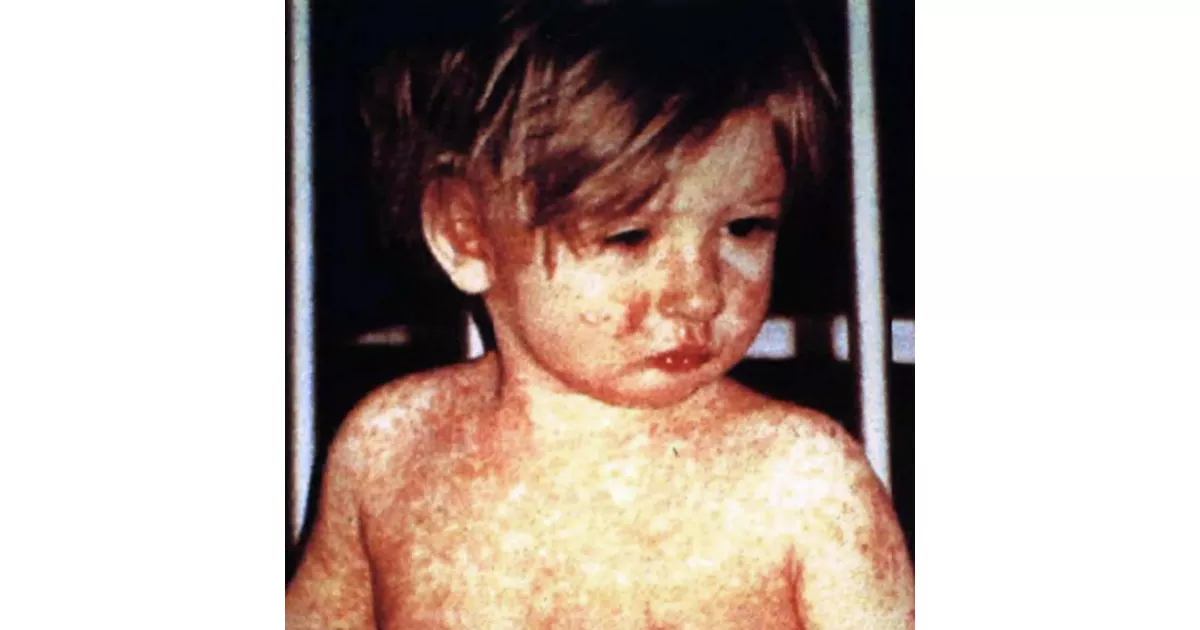1914: Measles mortality statistics
In 1914, a statistician for the Prudential Insurance Company estimated that 1% of all deaths in the temperate zone were caused by measles. He observed that 1–6% of measles cases ended fatally, depending on age, social conditions, and pre-existing health conditions.
1954: Measles virus isolated
In 1954, John Enders and Thomas C. Peebles isolated the measles virus from a 13-year-old boy from the United States, David Edmonston.
1957: Presumptive evidence of measles immunity
As of 1957, birth before 1957 is presumptive evidence of measles immunity because people born before 1957 are likely to have been naturally infected with the measles virus.
1957: Critical community size recognized in measles by M.S. Bartlett
In 1957, M.S. Bartlett recognized the concept of critical community size (CCS) in measles, referring to the minimum number supporting measles.
1963: Atypical measles reported
Atypical measles, distinct from modified measles, was reported in recipients of the inactivated measles vaccine used between 1963 and 1967. Atypical measles is characterized by a rash that first appears on the arms and legs, rather than on the head, and can be petechial instead of morbilliform; high fever; and severe pneumonia.
1963: First successful measles vaccine becomes widely available
In 1963, the first successful measles vaccine, developed by Maurice Hilleman at Merck, became widely available in the United States. It was associated with post-immunization reactions including fever and rash.
1965: Introduction of the Schwartz strain
In 1965, the Edmonston B strain was further attenuated to produce the Schwartz strain, to reduce reactions.
1967: Killed measles vaccine discontinued
A killed measles vaccine was given between 1963 and 1967 but was discontinued in favor of the live-attenuated vaccine due to the risk of atypical measles and inferior protection.
1967: Atypical measles reported
Atypical measles, distinct from modified measles, was reported in recipients of the inactivated measles vaccine used between 1963 and 1967. Atypical measles is characterized by a rash that first appears on the arms and legs, rather than on the head, and can be petechial instead of morbilliform; high fever; and severe pneumonia.
1968: Introduction of the Edmonston-Enders strain
In 1968, the Edmonston B strain was further attenuated to produce the Edmonston-Enders strain, to reduce reactions.
1971: MMR vaccine licensed for use in the United States
In 1971, the measles vaccine was combined with the mumps vaccine and rubella vaccine to create the MMR vaccine, which was licensed for use in the United States.
1975: Edmonston B discontinued
In 1975, the Edmonston B measles vaccine was discontinued.
1980: Measles deaths
In 1980, 2.6 million people died from measles.
1985: Measles deaths reported in U.S.
Between 1985 and 1992, in the U.S., deaths occurred in 0.2% of measles cases, but may be up to 10% in people with malnutrition. Most of those who die from the infection are less than five years old.
1987: Measles case fatality rate across the United States
Between 1987 and 2000, the case fatality rate across the United States was three deaths per 1,000 cases attributable to measles, or 0.3%.
1990: Measles deaths
In 1990, 545,000 people died due to measles.
1991: Measles outbreak in Philadelphia
In 1991, a measles outbreak in Philadelphia centered around the Faith Tabernacle Congregation, a faith-healing church discouraging vaccination. Over 1400 people were infected with measles and nine children died.
1992: Measles deaths reported in U.S.
Between 1985 and 1992, in the U.S., deaths occurred in 0.2% of measles cases, but may be up to 10% in people with malnutrition. Most of those who die from the infection are less than five years old.
1992: Greatest number of cases reported in the US since 1992
From January, to December 2019, 1,282 individual cases of measles were confirmed in 31 states. This is the greatest number of cases reported in the US since 1992.
1996: Increase in measles cases
By 2019 cases had increased to a total of 870,000, the highest since 1996.
1997: Highest caseload in the region since 1997
In 2024, the number of measles cases in Europe rose to 127,350, the highest caseload since 1997.
1999: Measles deaths fall due to vaccination campaign
Worldwide, measles fell 60% from an estimated 873,000 deaths in 1999 to 345,000 in 2005 due to a vaccination campaign.
2000: Measles case fatality rate across the United States
Between 1987 and 2000, the case fatality rate across the United States was three deaths per 1,000 cases attributable to measles, or 0.3%.
2000: Decrease in deaths from measles due to vaccination
Between 2000 and 2017, vaccination resulted in an 80% decrease in deaths from measles. In 2000, 2.6 million people died from measles.
2000: WHO establishes Global Measles and Rubella Laboratory Network
In 2000, the WHO established the Global Measles and Rubella Laboratory Network (GMRLN) to provide laboratory surveillance for measles, rubella, and congenital rubella syndrome.
2000: Decrease in measles deaths due to immunization
In 2012, the number of deaths due to measles was 78% lower than in 2000 due to increased rates of immunization among UN member states.
2000: Highest number of measles cases since measles declared eliminated in 2000
In April 2019, there have been 695 cases of measles reported in 22 states. As of April 2019, this is the highest number of measles cases since measles was declared eliminated in 2000.
2000: Measles cases decline in the United States
In the United States, measles affected approximately 3,000 people per million in the 1960s before the vaccine was available. With consistent widespread childhood vaccination, this figure fell to about 1 case per million by 2000.
2000: United States declared free of circulating measles
The United States was declared free of circulating measles in 2000.
2001: Measles cases from 2001 to 2011
From 2001 to 2011, there were 911 cases of measles in the United States.
2001: Eradication of Rinderpest
In 2001, Rinderpest, a cattle virus closely related to the measles virus, was eradicated.
2003: First fatality in the U.S. from measles since 2003
In 2015, a woman in Washington state died of pneumonia as a result of measles. She was the first fatality in the U.S. from measles since 2003.
2005: MMRV vaccine licensed
In 2005, the MMR vaccine was combined with the varicella vaccine to create the MMRV vaccine, which was licensed.
2005: Measles deaths fall due to vaccination campaign
Worldwide, measles fell 60% from an estimated 873,000 deaths in 1999 to 345,000 in 2005 due to a vaccination campaign.
2007: Measles death rates in England and Wales
Between 2007 and 2017, death occurred between two and three cases out of 10,000 in England and Wales.
2008: Global measles deaths
Estimates for 2008 indicate deaths fell further to 164,000 globally, with 77% of the remaining measles deaths in 2008 occurring within the Southeast Asian region.
2011: Measles cases from 2001 to 2011
From 2001 to 2011, there were 911 cases of measles in the United States.
2011: Stefan Lanka's Measles Challenge
In 2011, German anti-vaccination campaigner Stefan Lanka offered €100,000 to anyone who could scientifically prove measles is caused by a virus and determine the virus's diameter, claiming the illness is psychosomatic and the virus doesn't exist. This sparked controversy when evidence was provided but rejected, leading to a legal battle.
2011: WHO estimates of deaths caused by measles
In 2011, the WHO estimated that 158,000 deaths were caused by measles. This is down from 630,000 deaths in 1990.
2012: Decrease in measles deaths due to immunization
In 2012, the number of deaths due to measles was 78% lower than in 2000 due to increased rates of immunization among UN member states.
2013: Measles cases in European countries
In 2013–14, there were almost 10,000 cases in 30 European countries. Most cases occurred in unvaccinated individuals and over 90% of cases occurred in Germany, Italy, Netherlands, Romania, and United Kingdom.
October 2014: Measles outbreak in Berlin
Between October 2014 and March 2015, a measles outbreak in the German capital of Berlin resulted in at least 782 cases.
December 2014: Disneyland measles outbreak
In late December 2014, an outbreak believed to have originated from Disneyland theme park in California was responsible for infecting 147 people in seven U.S. states, Mexico, and Canada. 48% of the cases were unvaccinated.
2014: Global vaccination programs reduce measles deaths
By 2014, global vaccination programs had reduced the number of deaths from measles to 73,000.
2014: Measles outbreak initiated in Ohio
In 2014, a measles outbreak in Ohio began when two unvaccinated Amish men returned from missionary work in the Philippines. The outbreak grew to 383 cases across nine counties, with 89% occurring in unvaccinated individuals.
2014: CDC declares endemic measles, rubella, and congenital rubella syndrome had not returned to the United States.
In 2014, the CDC stated that endemic measles, rubella, and congenital rubella syndrome had not returned to the United States.
2014: Vietnamese measles epidemic
In the spring of 2014, an estimated 8,500 measles cases were reported in Vietnam as of 19 April, with 114 fatalities; as of 30 May, 21,639 suspected measles cases had been reported, with 142 measles-related fatalities.
March 2015: Measles outbreak in Berlin
Between October 2014 and March 2015, a measles outbreak in the German capital of Berlin resulted in at least 782 cases.
April 2015: Measles cases reported to the CDC
From 4 January to 2 April 2015, 159 cases of measles were reported to the CDC, with 70% linked to an earlier exposure in December 2014.
2015: Measles death in Washington state
In 2015, a U.S. woman in Washington state died of pneumonia resulting from measles. She was the first measles fatality in the U.S. since 2003. The woman had been vaccinated but was taking immunosuppressive drugs.
2015: First measles death since 2015 reported in West Texas
On 26 February 2025, the first measles death since 2015 was reported to be that of an unvaccinated school-aged child in West Texas.
August 2016: Measles outbreak in Myanmar
In August 2016, at least 40 children died during a measles outbreak in the Naga Self-Administered Zone in a remote northern region of Myanmar, probably caused by lack of vaccination in an area of poor health infrastructure.
2016: Global cases decrease
Between 2000 and 2016, global cases decreased by 84%.
2016: Brazil won a measles elimination certificate
Brazil won a measles elimination certificate by the Pan American Health Organization in 2016, but the Ministry of Health has proclaimed that the country has struggled to keep this certificate, since two outbreaks had already been identified in 2018, one in the state of Amazonas and another one in Roraima, in addition to cases in other states.
2016: Decreasing detection of measles virus genotypes
Data from 2016 to 2018 show that the most frequently detected measles virus genotypes are decreasing, suggesting that increasing global population immunity has decreased the number of chains of transmission.
2016: Cochrane review of vitamin A supplementation
In 2016, a Cochrane review of two randomised controlled trials (RCTs) involving 260 children with measles compared vitamin A to placebo. The authors concluded that no trials were found that assessed whether vitamin A supplementation in children with measles prevents blindness.
2016: Record low of measles cases in Europe
In 2016, a record low of 4,400 cases in Europe were reported.
2016: Measles declared eliminated from the Americas
In 2016, as a result of widespread vaccination, measles was declared eliminated from the Americas.
2016: Spread of measles interrupted in Brazil
In 2016, the spread of measles had been interrupted in Brazil, with the last-known case twelve months earlier in the state of Ceará.
June 2017: First case of measles in 20 years in Maine
In June 2017, the Maine Health and Environmental Testing Laboratory confirmed a case of measles in Franklin County. This was the first case of measles in Maine in 20 years.
2017: Cases reappear in the Americas
After being declared eliminated from the Americas in 2016, measles cases reappeared in 2017.
2017: Worldwide vaccination of children
As of 2017, about 85% of children worldwide had received their first dose of measles vaccine, leading to an 80% decrease in deaths from measles between 2000 and 2017. However, rates of disease and deaths increased from 2017 on due to a decrease in vaccination.
2017: Measles death rates in England and Wales
Between 2007 and 2017, death occurred between two and three cases out of 10,000 in England and Wales.
2017: Measles resurgence in Europe
From 2017, a measles resurgence in Europe started to occur with numbers increasing in that year to 21,315 cases, with 35 deaths.
2017: Measles reproductive number review
In 2017, a review of measles's reproductive number estimates gave a range of 3.7 to 203.3, which varies beyond the frequently cited range of 12 to 18.
2017: Two cases in 2017
In April 2019, New York Mayor Bill de Blasio declared a public health emergency because of "a huge spike" in cases of measles where there were 285 cases centred on the Orthodox Jewish areas of Brooklyn in 2018, while there were only two cases in 2017.
2017: Global measles related deaths
There were 142,300 measles related deaths globally in 2018, of which most cases were reported from African and eastern Mediterranean regions. These estimates were slightly higher than that of 2017, when 124,000 deaths were reported due to measles infection globally.
July 2018: Measles case in Portland, Oregon
In July 2018, a measles case occurred in Portland, Oregon, exposing 500 people, with 40 lacking immunity and being monitored by county health officials.
August 2018: Totaling 1,053 confirmed cases
By August 2018, Brazil had struggled to keep its measles elimination certificate due to outbreaks in the states of Amazonas and Roraima, as well as cases in other states, totaling 1,053 confirmed cases. The contagion was related to the importation of the virus, especially from Venezuela.
October 2018: Measles outbreak in Brooklyn
In October 2018, a measles outbreak began in Brooklyn, with more than 200 cases reported through February 2019, tied to the Orthodox Jewish community.
2018: Cases reappear in the Americas
After being declared eliminated from the Americas in 2016, measles cases reappeared in 2018.
2018: Measles remains a leading cause of vaccine-preventable deaths
As of 2018, measles remains a leading cause of vaccine-preventable deaths in the world.
2018: Decreasing detection of measles virus genotypes
Data from 2016 to 2018 show that the most frequently detected measles virus genotypes are decreasing, suggesting that increasing global population immunity has decreased the number of chains of transmission.
2018: Measles outbreak with well beyond 115,000 cases and over 1,200 deaths
In 2018, a measles outbreak resulted in well beyond 115,000 cases and over 1,200 deaths.
2018: 285 cases centred on the Orthodox Jewish areas of Brooklyn
In 2018, there were 285 cases of measles centred on the Orthodox Jewish areas of Brooklyn
2018: Measles outbreaks worldwide
In 2019, the total number of cases worldwide climbed to 869,770. Cases reported in the first three months of 2019 were 300% higher than in the first three months of 2018, with outbreaks in every region of the world. By mid-November, there were over 413,000 cases globally, with an additional 250,000 cases in DRC.
2018: Increase in measles cases in Europe
In preliminary figures for 2018, reported measles cases in Europe increased 3-fold to 82,596 in 47 countries, with 72 deaths; Ukraine had the most cases (53,218).
2018: Measles vaccination rate in Samoa
The measles vaccination rate in Samoa was from 31 to 34% in 2018, before the vaccination campaign.
2018: Global measles related deaths
There were 142,300 measles related deaths globally in 2018, of which most cases were reported from African and eastern Mediterranean regions. These estimates were slightly higher than that of 2017, when 124,000 deaths were reported due to measles infection globally.
February 2019: Measles outbreak in Brooklyn
From October 2018 to February 2019, a measles outbreak in Brooklyn reported more than 200 cases, tied to the Orthodox Jewish community.
April 2019: Measles resurgence in 2019 in the United States
In April 2019, a resurgence of measles occurred, tied to parents choosing not to vaccinate. Cases were first reported in Washington state in January, with an outbreak in Clark County. New York Mayor Bill de Blasio declared a public health emergency due to a "huge spike" in measles cases.
April 2019: Highest number of measles cases since measles declared eliminated in 2000
As of April 2019, 695 cases of measles had been reported in 22 states, the highest number of cases since measles was declared eliminated in 2000.
May 2019: Measles outbreak among Malaysian Orang Asli
From May 2019, a measles outbreak happened among the Malaysian Orang Asli sub-group of Batek people in the state of Kelantan, causing the deaths of 15 from the tribe.
December 2019: Measles cases confirmed in 31 states
From January to December 2019, 1,282 individual cases of measles were confirmed in 31 states. This is the greatest number of cases reported in the US since 1992, with 128 hospitalizations and 61 reporting complications.
December 2019: Measles vaccination rate increased in Samoa
In December 2019, a vaccination campaign in Samoa brought the measles vaccination rate to an estimated 94% of the eligible population.
2019: Cases reappear in the Americas
After being declared eliminated from the Americas in 2016, measles cases reappeared in 2019.
2019: Increase in measles cases
By 2019 cases had increased to a total of 870,000, the highest since 1996.
2019: Measles outbreak with nearly 5,000 deaths and 250,000 infections
In 2019, a measles outbreak resulted in nearly 5,000 deaths and 250,000 infections, spreading to all provinces in the country, with most deaths among children under five. The WHO reported this as the world's largest and fastest-moving epidemic.
2019: Measles outbreaks worldwide
In 2019, the total number of cases worldwide climbed to 869,770. Cases reported in the first three months of 2019 were 300% higher than in the first three months of 2018, with outbreaks in every region of the world. By mid-November, there were over 413,000 cases globally, with an additional 250,000 cases in DRC.
2020: Cases reappear in the Americas
After being declared eliminated from the Americas in 2016, measles cases reappeared in 2020.
2020: Measles cases fall to pre-outbreak levels in 2020
Following the end of the 2019 outbreak, reported measles cases fell to pre-outbreak levels with 13 cases reported in 2020.
2020: COVID-19 pandemic hinders vaccination campaigns
In 2020, the number of cases reported was lower compare to 2019. According to the WHO, the COVID-19 pandemic hindered vaccination campaigns in at least 68 countries, including in countries that were experiencing outbreaks, which caused increased risk of additional cases.
2021: 49 cases reported in 2021
Following the end of the 2019 outbreak, reported measles cases fell to pre-outbreak levels with 49 cases reported in 2021.
2022: 121 cases reported in 2022
Following the end of the 2019 outbreak, reported measles cases fell to pre-outbreak levels with 121 cases reported in 2022.
2022: Global Measles Deaths
In 2022, there were an estimated 136,000 measles deaths globally, mostly among unvaccinated or under vaccinated children under the age of 5 years.
2023: Measles cases increase
In November 2024, the WHO and CDC reported that measles cases increased by 20% in 2023, primarily due to insufficient vaccine coverage in the world's poorest and conflict-affected regions, increasing from about 8.6 to 10.3 million cases.
February 2024: WHO warns of measles outbreaks due to COVID-19 disruptions
In February 2024, the World Health Organization said more than half of the world was at risk of a measles outbreak due to COVID-19 pandemic-related disruptions. All the world regions have reported such outbreaks with the exception of the Americas, though these could still be expected to become hotspots in the future.
November 2024: WHO and CDC report increase in measles cases
In November 2024, the WHO and CDC reported that measles cases increased by 20% in 2023, primarily due to insufficient vaccine coverage in the world's poorest and conflict-affected regions, increasing from about 8.6 to 10.3 million cases.
2024: Significant increase in measles cases in Europe
In 2024, Europe experienced a significant increase in measles cases, with 127,350 cases reported, the highest since 1997. This represented a third of global measles cases, with Romania being the major center of the outbreak reporting 30,692 cases.
2024: Measles outbreak declared in the Bangsamoro region in the Philippines
In 2024, a measles outbreak was declared in the Bangsamoro region in the Philippines with at least 592 cases and 3 deaths.
2024: Entire 2024 total was only 285
In March 2025, the CDC recorded 483 confirmed cases across 20 states. This exceeds the entire 2024 total that was only 285.
February 2025: Measles outbreak in Texas and New Mexico
As of February 2025, a measles outbreak was ongoing amongst unvaccinated communities in Texas and New Mexico. On 26 February 2025, the first measles death since 2015 was reported in West Texas. The confirmed number of measles cases was 124, with most cases in children ages 5–17.
March 2025: CDC records confirmed measles cases across 20 states
As of March 2025, the CDC recorded 483 confirmed measles cases across 20 states, resulting in 2 deaths and 70 hospitalizations. This exceeds the entire 2024 total of 285.
May 2025: Southwest United States measles outbreak
As of May 2025, in the Southwest United States measles outbreak, Secretary of Health and Human Services Robert F. Kennedy Jr. has nevertheless continued to endorse vitamin A during the measles epidemic, along with other unscientific, non-vaccine measures, a response for which he has been widely criticized.
August 2025: Measles outbreak in Alberta
As of August 2025, an outbreak in Alberta resulted in 1800 confirmed measles cases, prompting health experts to advise Albertans to update their measles vaccinations.
2025: Cases reappear in the Americas
After being declared eliminated from the Americas in 2016, measles cases reappeared in 2025.
2025: U.S. outbreak shows vitamin A sources administered as protection before illness
In the 2025 U.S. outbreak, children are presenting at hospitals with measles and hypervitaminosis A because their parents were administering vitamin A sources (supplements or cod liver oil) as attempts of protection before the children became ill with measles.
Mentioned in this timeline
Ukraine is a country in Eastern Europe the second-largest on...
Nigeria is a West African nation the most populous in...
Venezuela officially the Bolivarian Republic of Venezuela is located on...
Sudan officially the Republic of the Sudan is a country...
Myanmar also known as Burma is a Southeast Asian country...

Disneyland located in Anaheim California is the first theme park...
Trending

40 minutes ago Jamie Lee Curtis announces that 'The Bear' will conclude with its fifth season.

40 minutes ago Isaac Keys reflects on losing 'Draft Day' role to Chadwick Boseman, NFL exit.
40 minutes ago Onyeka Okongwu Scores 25 Points, Makes Unexpected Leap for the Hawks

2 hours ago Cutter Gauthier Featured in NHL DFS Picks and Player Prop Discussions.

2 hours ago Ex-Advisor Convicted of Defrauding Jrue Holiday and Other NBA Players

2 hours ago Jalen Johnson injured in first quarter, Hawks win; questionable for Blazers game.
Popular

Ken Paxton is an American politician and lawyer serving as...

Hillary Diane Rodham Clinton is a prominent American politician lawyer...

Jesse Jackson is an American civil rights activist politician and...

Jim Carrey is a Canadian-American actor and comedian celebrated for...

Bill Clinton served as the nd U S President from...

XXXTentacion born Jahseh Dwayne Ricardo Onfroy was a controversial yet...
